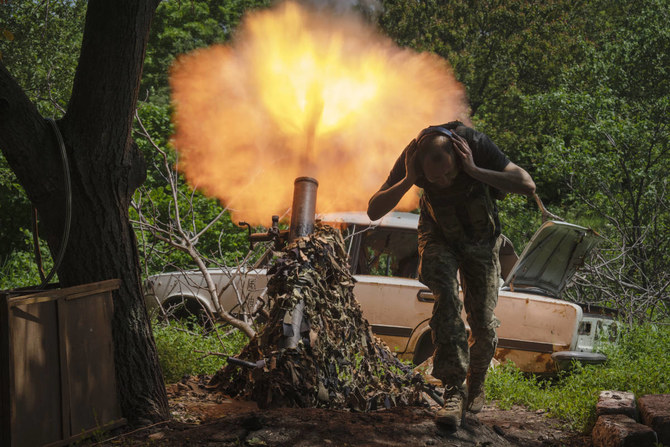KYIV: Russia said on Monday its military hit Ukrainian air bases in overnight strikes and Ukrainian forces shelled industrial facilities inside Russia as both sides sought the upper hand ahead of what Kyiv hopes will be a decisive counter-offensive.
In a rare acknowledgement of damage to a military “target,” Ukraine said that work was under way to restore a runway and that five aircraft were taken out of service in the western region of Khmelnitskiy, though it did not name the sites.
A military airfield was sited in the region before the war.
“At the moment, work is continuing to contain fires in storage facilities for fuel and lubricants and munitions,” the Khmelnitskiy regional governor’s office said.
Russian state-owned news agency RIA cited the defense ministry as saying more than one air base had been hit. There was no confirmation from Ukraine of damage to other air bases.
The Ukrainian capital came under attack for the 16th time this month after a second successive night of bombardment. But officials said most of the drones and missiles fired overnight had been shot down and no targets were hit in the morning.
Ukrainian President Volodymyr Zelensky praised US-supplied Patriot anti-missile defenses.
“When Patriots in the hands of Ukrainians ensure a 100 percent interception rate of any Russian missile, terror will be defeated,” Zelensky said in his nightly video address.
The general staff of Ukraine’s armed forces said that all 11 missiles used in the daytime attacks had been destroyed. But it made no mention of the Patriot systems.
PATRIOTS AND INTERCEPTING TARGETS
Yuriy Ihnat, a spokesperson for Ukraine’s air force, suggested the Patriot was behind the latest results against incoming Iskander ballistic missiles.
“I think you can guess,” Ihnat told Ukrainian television. “If Iskander-M missiles are intercepted, you can draw conclusions about the means that specifically targeted the objectives — ballistic targets.”
The attacks, which sent Kyiv residents running for shelter in metro stations, were part of a new wave of Russian air strikes this month as Ukraine, armed with new Western weapons, prepares a push to try to take back territory Russia has seized in the “special military operation” launched in February 2022.
“With these constant attacks, the enemy seeks to keep the civilian population in deep psychological tension,” said Serhiy Popko, the head of the city’s military administration.
Two people were killed and eight wounded in a Russian attack on the Ukrainian city of Toretsk in the eastern region of Donetsk on Monday, regional Governor Pavlo Kyrylenko said.
Serhiy Cherevatyi, spokesperson for the eastern group of Ukrainian Forces, told Ukrainian television there had been three military clashes in his region in the past 24 hours.
“But the enemy has maintained its fire on our positions. There were 373 shelling hits of various types in the past 24 hours and six air strikes on our positions,” he said.
Reuters was not able to confirm the battlefield accounts.
Cherevatyi also said that Wagner mercenary units were being replaced in the besieged eastern city of Bakhmut by Russian paratroops and motorized units.
Russia’s Wagner private army began handing over positions to regular troops this week after declaring full control of Bakhmut following the longest and bloodiest battle of the war.
He said Ukraine’s military was conducting “a reorganization and other military moves ... so that further movement can be even more successful in terms of hitting the enemy.”
Moscow said it invaded Ukraine to “denazify” its neighbor and protect Russian speakers. Western opponents say the invasion is an imperialist land grab in which tens of thousands have been killed, millions uprooted and cities reduced to ruins.
Russia says it is open to resuming stalled peace talks with Kyiv and has welcomed mediation efforts from Brazil and China.
But a top aide to Zelensky said Kyiv’s peace plan, envisaging the full withdrawal of Russian troops, was the only way to end the war.
“There cannot be a Brazilian peace plan, a Chinese peace plan, a South African peace plan when you are talking about the war in Ukraine,” chief diplomatic adviser Ihor Zhovkva told Reuters in an interview late on Friday.
CALL FOR A DMZ
Another Zelensky aide, Mykhailo Podolyak, wrote on Twitter that any post-war settlement should include a demilitarised zone of 100-120 km (62-75 miles) inside Russia along the border.
The European Union’s top diplomat, Josep Borrell, said he believed Russia would not want to negotiate while it was still trying to win the war.
Ukraine’s military said an attack on Odesa port had caused a fire and damaged infrastructure but did not specify whether the damage threatened grain exports.
Ukraine is an key global grain supplier and the port is vital for shipping. It is also one of three countries in a UN-brokered deal on the safe export of grain via the Black Sea.
Russia said on Monday that the grain deal would no longer be operational unless a UN agreement with Moscow to overcome obstacles to Russian grain and fertilizer exports was fulfilled.
This month Moscow reluctantly agreed to extend the grain deal until July 17.
After months of attacks on energy facilities, Russia is now targeting military facilities and supplies to try to disrupt Ukraine’s preparations for its counterattack, Kyiv says.
Moscow says Ukraine has stepped up drone and sabotage attacks on targets inside Russia as it readies the offensive.















